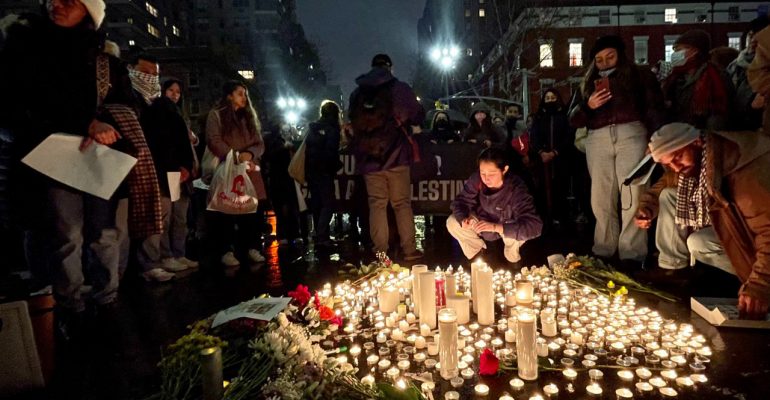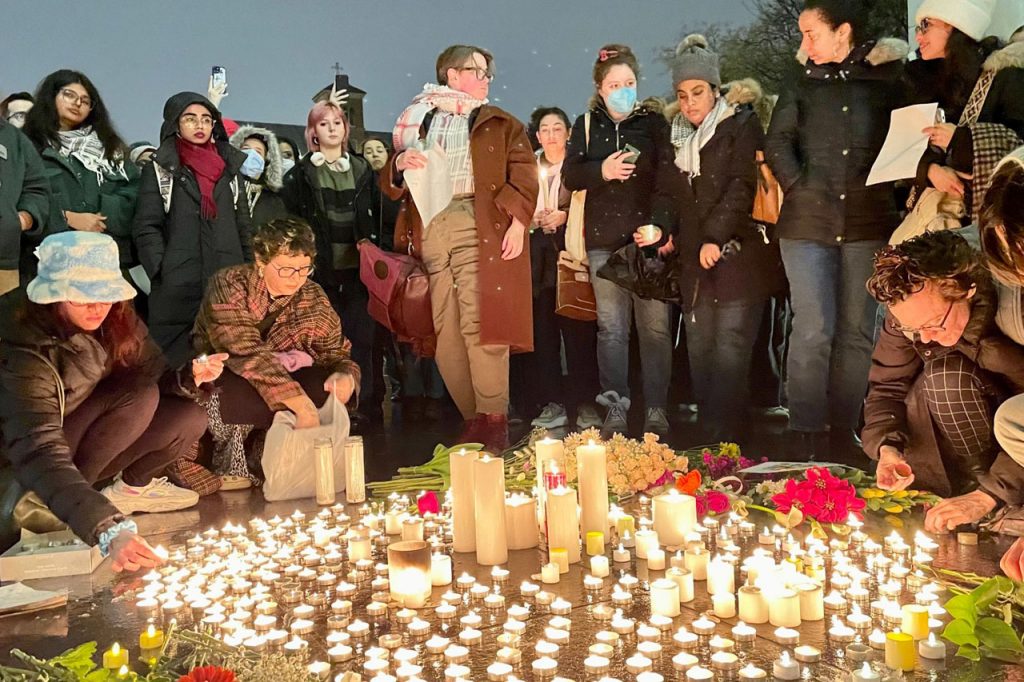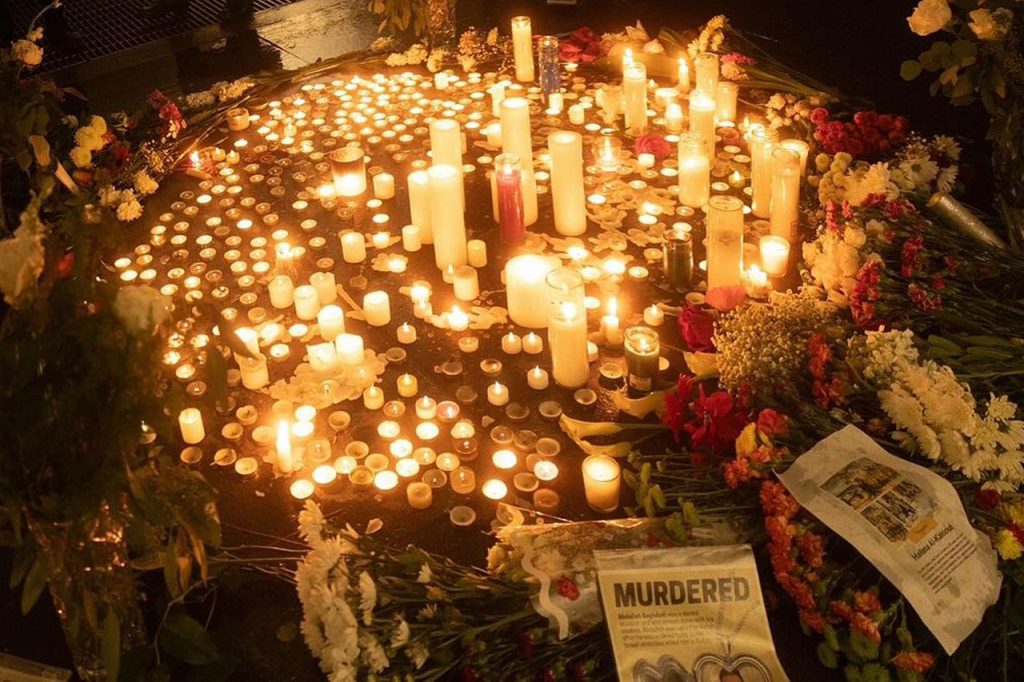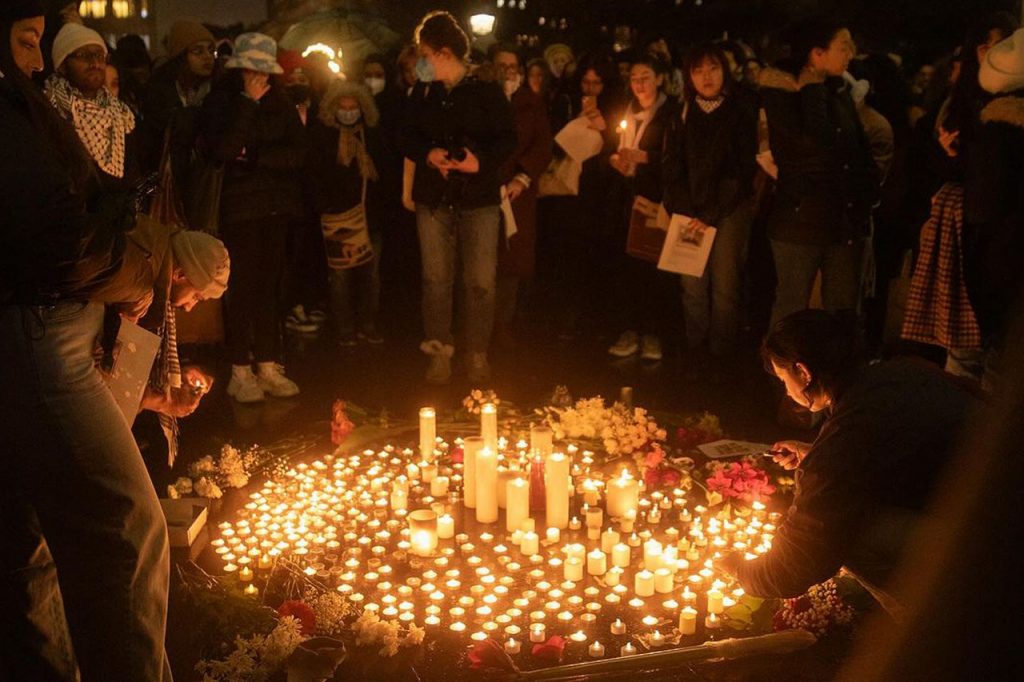New Yorkers gather to pay tribute to Gaza’s slain poets and writers
February 15, 2024 2024-03-04 13:52New Yorkers gather to pay tribute to Gaza’s slain poets and writers

New Yorkers gather to pay tribute to Gaza’s slain poets and writers
Writers, poets and journalists shared poems and stories to pay tribute to 13 poets and dozens of journalists killed during Israel’s war on Gaza
Draped in keffiyehs and holding candles and flowers, scores flocked to Manhattan’s Washington Square Park, to mourn Gaza’s writers, poets and journalists killed by Israel during the war in Gaza.
Gathered around a circle of candles and flowers under the Washington Arch, members of the Palestinian-American community in New York City took turns sharing poems and anecdotes from Palestinian writers and poets. The event was organized by the Writers Against the War on Gaza (Wawog).

Among the nearly 26,000 civilians killed by Israel since 7 October, 13 poets and at least 74 Palestinian journalists and media workers have been confirmed dead, according to the Committee to Protect Journalists.
The International Federation of Journalists (IFJ) estimates 90 Palestinian journalists have been killed and three Lebanese ones, while the Euro-Med Human Rights Monitor has listed 119 journalists killed in Gaza.
Hiba Abu Nada, Refaat Alareer and Rashid Hussein
“We know all the devastating numbers, and we have gathered together and we have screamed and mourned and shut down business, and shut down this city and refused to turn away from our brothers and sisters,” Ilana Cruger-Zaken, a scholar at New York University, said in her opening remarks.
The attendees were then called on to recall how New York’s cultural institutions have whitewashed an ongoing “genocide”. Anne Boyer, former poetry editor of New York Times Magazine, resigned in November, citing “verbally sanitized hellscapes” and “war-mongering lies”.
The renowned New York cultural and community center, 92nd Street Y, cancelled a talk with Pulitzer-winning author, Viet Thanh Nguyen, for his pro-Palestine views. After several staff members resigned in protest against the cancellation of his talk, the center’s prestigious literary reading series was put on halt.

The first poem that was shared at the vigil was, I am unfinished business, by the Palestinian-American poet, Fady Joudah, followed by well-known Palestinian voices, Ghassan Kanafani and Mahmoud Darwish.
Late poet Rashid Husseni’s, Revolt Against Travel, drew cheers and applause.
“Nothing remains but for the revolution to begin its alphabet /Nothing remains but for crime to be murdered. Revolution is born in eyes that have no homeland, Revolution is born as a landless peasant, As a landowning cop, A land where all has been imprisoned,” were some lines from Hussein’s poem were recited.
The crowd paid tribute to beloved Gaza poet, Hiba Abu Nada, through her poem, I grant you refuge, written on 10 October, 10 days before an Israeli air strike killed her in her home.
For her debut, Oxygen isn’t for the dead, Abu Nada won second place in the Sharjah award for creativity.

Some of the works came from inside the Wawog community itself, including a powerful and particularly moving essay by Palestinian-American writer Sarah Aziza, which was written for her three remaining cousins in Gaza that she has not heard from in days.
Aziza’s family is from Gaza and currently displaced to Khan Younis in central Gaza.
“Watching our dust-choked bodies move, their limbs thinner by the day, I fill with wonder and bewilderment. How, I wonder – as in, how do they still have the strength? And – more provocatively – why?” Aziza shared.
The vigil concluded with the famous poem, If I must die, by prominent Palestinian professor, poet and writer, Refaat Alareer.
Alareer was killed by an Israeli air strike on 7 December, sending shockwaves across the Palestinian community.
Source: The Middle East Eye







